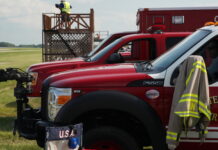It’s officially spring time, and most air show organizers have been working on their 2015 show for some time. You’ve probably got your performers, announcer and air boss lined up, and you are now starting to review rental and catering contracts.
But how many of you have started thinking about, or doing something about, CFR/ARFF planning?
Typically, CFR/ARFF planning starts just a few weeks, or even just a few days, before an air show (or not at all). But good CFR/ARFF planning starts months in advance.
So before things start to get hectic, consider doing this now:
- Your air show organizer or air operations director should meet with the top fire official who will be working your show. Outline your goals and objectives in terms of pilot rescue and extraction.
- Discuss the options and agree to an overall plan for personnel, equipment, location and guidelines for your show. Remember that the industry standard is the ability to have the first responders to the scene of any accident within sixty (60) seconds.
- Discuss what equipment you will need and have on hand, and where it will be located.
- Go over what additional equipment you might need in case an aircraft ends up inverted on the runway and where it will be located. And who does what, exactly. This takes planning to be done expeditiously and safely.
- Go out to the air show site with your top fire official and walk the site.
- Practice the route to show center with an actual response vehicle and time it (most air show accidents happen within several hundred feet of air show center). 30-60 seconds is the goal.
- Require that response crews be in turnout gear any time air show aircraft are in the air.
- Arrange water, food and restroom facilities for the response crews at or in the immediate vicinity of their station.
- Don’t allow guests or visitors on, in or near the equipment, period!
- What will be the location of top fire official during show? On the air boss stand with radio communication to the crews is usually best.
- Establish and brief everyone that CFR/ARFF crews do not need approval to roll and respond; if they see an aircraft go down, they roll. The Air Boss will handle taxiing and airborne aircraft, the announcer the crowd.
- Have your Air Boss meet with CFR/ARFF before any flying and go over the plan together with your air operations director. Before or during the show, the Air Boss should let the organizer or air operations director know if changes need to be made and why.
- Require that all performers, civilian as well as military, send the air show, well in advance, aircraft and cockpit photos, with labels for key switches and equipment that a crash crew needs to know in order to safely extract them from their aircraft in an emergency. Put these in a notebook and distribute to CFR/ARFF crews before the show.
- Schedule a meeting and briefing, at the performing aircraft, before any flying activities, with each pilot and CFR/ARFF. Have the pilots show the response crews the key switches, handles, etc. they need to know about to rescue them. If the response crew changes on Sat or Sun, repeat it with the new crew. Do not start flying without this!
- An Operations and Emergency Preparedness Briefing should be conducted by the air operations director and the senior fire official who will be working the show with all participants and agencies, the week before the show. Brief the Emergency Operations Plan, the CFR/ARFF Plan and role play a few scenarios. So when the “curtain goes up,” everyone knows what everyone else has been briefed to do and is expected to do.
Does this all sound like a lot of work? Actually it is not. Most Fire Chiefs or Battalion Chiefs will be delighted that the air show director or air operations director has contacted them early and want to discuss the CFR/ARFF Plan with them.
Remember this: most air show directors who have experienced an accident at their show thought it could never happen to them. By doing the sort of planning outlined above, you may have just taken the first important steps in saving a performer’s life. Preparation drives performance.








